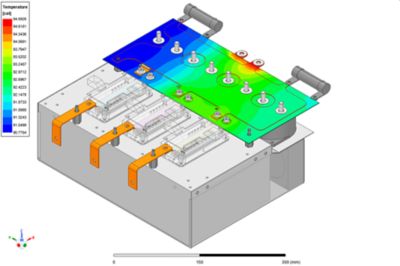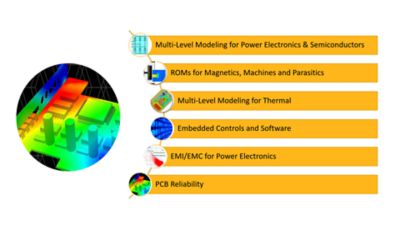-
United States -
United Kingdom -
India -
France -
Deutschland -
Italia -
日本 -
대한민국 -
中国 -
台灣
-
Ansys is committed to setting today's students up for success, by providing free simulation engineering software to students.
-
Ansys is committed to setting today's students up for success, by providing free simulation engineering software to students.
-
Ansys is committed to setting today's students up for success, by providing free simulation engineering software to students.
-
Contact Us -
Careers -
Students and Academic -
For United States and Canada
+1 844.462.6797
ANSYS BLOG
January 6, 2022
SuperGrid Institute Responds to Energy and Climate Demands Using Ansys Multiphysics Solutions
Researchers and developers at SuperGrid Institute use Ansys electronics software solutions to perform studies on power converters, critical links in the chain between electric generators and consumers, for their clients.
As an independent research and innovation institute based in France, SuperGrid Institute is dedicated to developing technologies and services for the supergrid — the electricity transmission network of the future — that uses direct current (DC) and alternating current (AC) at very high voltages. Power electronic systems are key drivers for the integration of large amounts of renewable energy injected into the transmission system, and therefore a main focus at SuperGrid Institute.
One common use of DC power is electric vehicle recharging stations. Innovative power converters and research efforts are needed to develop cost effective solutions for integrating these stations into the grid. SuperGrid Institute proposes a medium-voltage direct current (MVDC) grid structure in response to these challenges and offers grid studies and related technological solutions developed with industrial partners.
Rising Demand for Power Electronic Converters
Energy requirements are changing rapidly, with an ever-increasing demand for innovative solutions capable of integrating renewable energy sources, supporting electric vehicle (EV) DC chargers, but also data centres, electrical transportation, electrolysers, etc. In response to the requirement to drastically reduce CO2 emissions globally, MVDC electricity networks are SuperGrid Institute’s proposed solution. The power electronics program at SuperGrid Institute develops power conversion solutions based on technical and economic studies at a systems level and validates power converter topologies for MVDC systems.
Figure 2. Temperature prediction on an inverter topology due to AC/DC power flow
With climate change and the rising popularity of electric vehicles increasing demands on existing grids, power converters are essential to distribute clean energy at lower costs. Most forms of renewable energy, like solar power and wind, are also forms of power-electronic-based generation. These intermittent and low inertia renewable energies sources require fast and controllable power electronics systems for safe operation.
Complex Power Conversion Requires Multiphysics Simulation
Because the electric grid was designed more than a century ago, it’s challenging to maintain stability while accommodating so many power electronics. It’s crucial that the converters are integrated and interact with the grid properly so that whether 15 or 50 people charge with DC simultaneously, the grid can supply power equally to all.
Figure 3. Ansys multiphysics and multidomain approach for power electronics simulation
SuperGrid Institute quickly realized they needed a multiphysics platform to support the complex structures within the converters, including inner mechanical constraints and thermal challenges related to power density. Engineers also had to account for electromagnetic differences related to the high-frequency behavior of the semiconductors within the systems and obtain a seamless data exchange among these variables to perform model reduction accurately and successfully. More importantly, SuperGrid Institute had to merge simulation results with system approach models to test various concepts in a short amount of time and determine which to implement in real-life scenarios.
To meet their needs, SuperGrid Institute uses Ansys products in tandem — including Ansys Q3D Extractor, Ansys Twin Builder, Ansys Maxwell, and Ansys Icepak. The ability to export Q3D Extractor results directly into Twin Builder or couple Maxwell results with Icepak to perform thermoelectrical simulation, are valuable advantages of using the Ansys workflow.
“Now, multiphysics modeling is embedded in SuperGrid Institute’s design culture,” says Benhur Zolett, Power Electronics R&D Engineer at SuperGrid Institute. “The biggest benefit for SuperGrid Institute of using Ansys software is the ability to test a lot of concepts in a short amount of time and see which ones we want to implement.”
Ansys offers an intuitive and unified platform to provide the SuperGrid Institute team with the best solutions for their engineering needs. To learn more about SuperGrid Institute and how it uses Ansys simulation to develop innovative electric power systems, read our case study here.












-1?)

